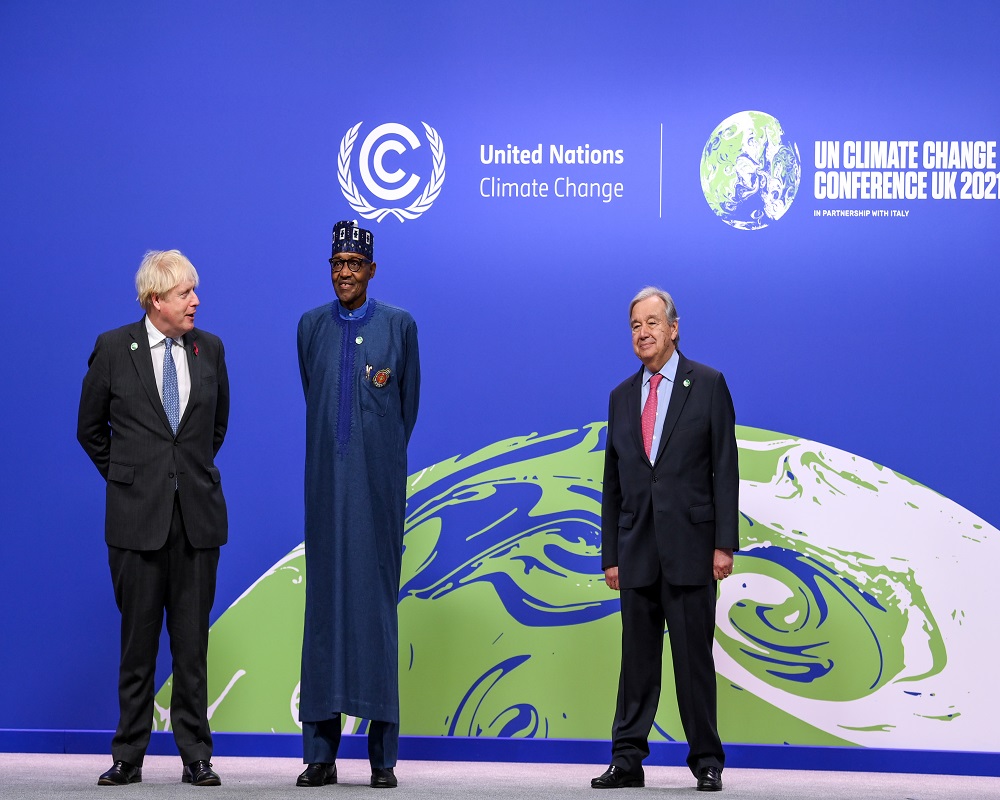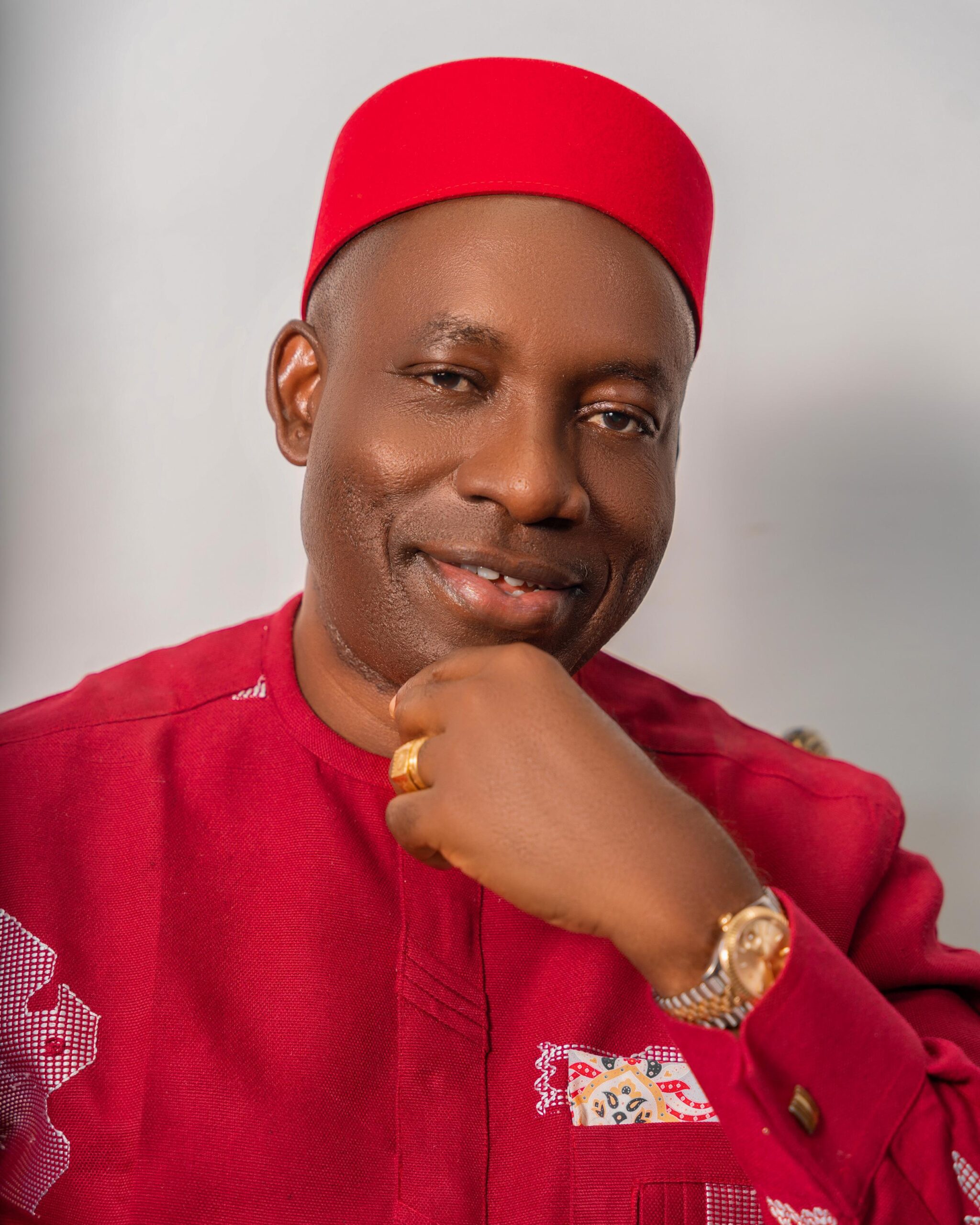News
How COP26 Agreed to Keep 1.5C Alive and Finalises Paris Agreement

COP26 came to an end in Glasgow on Saturday November 13, 2021, with nearly 200 countries agreeing the Glasgow Climate Pact to keep 1.5°C alive and finalise the outstanding elements of the Paris Agreement.

President Muhammadu Buhari flanked by Prime Minister Boris Johnson and Antonio Guterres, Secretary-General of the United Nations
Climate negotiators ended two weeks of intense talks with consensus on urgently accelerating climate action.
The Glasgow Climate Pact, combined with increased ambition and action from countries, means that the goal of limiting global temperature to 1.5°C above pre-industrial levels remains in sight, but it will only be delivered with concerted and immediate global efforts.
The Glasgow Climate Pact will speed up the pace of climate action. All countries agreed to revisit and strengthen their current emissions targets to 2030, known as Nationally Determined Contributions (NDCs), in 2022.
This will be combined with a yearly political roundtable to consider a global progress report and a Leaders summit in 2023.
President Muhammadu Buhari pledged that Nigeria would cut its emissions to net zero by 2060 and called on developed countries to support countries like Nigeria which require adequate and sustained technical and financial support to attain climate goals.
To demonstrate commitment to Nigeria’s international ambition and to support the implementation of Nigeria’s adaptation and mitigation measures, the President signed Nigeria’s Climate Change Bill into Law just days after COP26.
By the end of COP26:
· The UK pledged significant new funding to priority programmes on finance, adaptation and resilience, innovation and nature which Africa stands to benefit from.
· The Paris Rulebook, which are the guidelines for how the Paris Agreement will be implemented, finalised after six years of discussions. This Rulebook will now allow countries to be held to account as they deliver on their targets. This includes Article 6 of the rulebook, which establishes a robust framework for countries to exchange carbon credits through the UNFCCC.
· Agreed action on phasing down fossil fuels, heeding calls from civil society and countries most vulnerable to climate impacts
· Decisions made went further than ever before in recognising and addressing loss and damage from the existing impacts of climate change.
· There were also commitments to significantly increase financial support through the Adaptation Fund as developed countries were urged to double their support to developing countries by 2025.
· Many more countries and organisations committing to phase down unabated coal power and ending international coal financing.
The final COP26 text follows two years of intense diplomacy and campaigning undertaken by the UK Presidency to raise ambition and secure action from almost 200 countries. When the UK took on the COP26 mantle, in partnership with Italy, nearly two years ago, only 30% of the world was covered by net zero targets. This figure is now at around 90%. Over the same period, 154 Parties have submitted new national targets, representing 80% of global emissions.
Reflecting on the task ahead, COP26 President Alok Sharma said: “We can now say with credibility that we have kept 1.5 degrees alive. But, its pulse is weak and it will only survive if we keep our promises and translate commitments into rapid action. I am grateful to the UNFCCC for working with us to deliver a successful COP26.
“From here, we must now move forward together and deliver on the expectations set out in the Glasgow Climate Pact, and close the vast gap which remains. Because as Prime Minister Mia Mottley told us at the start of this conference, for Barbados and other small island states, ‘two degrees is a death sentence’.
“It is up to all of us to sustain our lodestar of keeping 1.5 degrees within reach and to continue our efforts to get finance flowing and boost adaptation. After the collective dedication which has delivered the Glasgow Climate Pact, our work here cannot be wasted.”
Speaking also, British High Commissioner to Nigeria, Catriona Laing CB said: “Nigeria is highly vulnerable to climate change and although it has been ambitious in developing adaptation and mitigation plans, these plans need to be transformed into action – by the federal and state governments working closely with local communities, civil society and other stakeholders, and with the support of development partners.
“We will continue to support Nigeria make progress on decarbonisation of the power sector and stay the course on power sector reforms, creating the enabling environment for offgrid solar at scale by, for example, removing high VAT and customs on domestic solar equipment.
“We will also continue to support efforts that will see Nigeria take action to reduce greenhouse gases such as black carbon and methane from the atmosphere by ending gas flaring as well as adopting climate smart agro-forestry and agricultural reforms as sustainable solutions for Nigeria’s people, nature and biodiversity.”
News
PalmPay Launches CSR Initiatives to Empower Women, Foster Financial Literacy in Northern Nigeria

In a strategic move to expand financial inclusion in Nigeria, leading mobile banking platform, PalmPay has launched a series of CSR programs across Kano and Kaduna. The CSR initiative named “Passing the Baton” represents the brand’s commitment to passing on knowledge and providing the resources individuals and businesses need to achieve financial independence and drive economic empowerment.

This initiative is a bold move by PalmPay to bridge the opportunity gap in the North by providing financial literacy training and micro-business branding support to 5,000 women-owned businesses in Kano and Kaduna. This strategic initiative reaffirms PalmPay’s commitment to inclusive development and economic empowerment, particularly in underserved regions.
“At PalmPay, we believe that real financial inclusion must be far reaching and cover the grassroots,” said Chika Nwosu, Managing Director of PalmPay. “Our new CSR program is focused on supporting gender equity by equipping women with the knowledge, tools, and visibility they need to thrive as entrepreneurs in their communities.”
Through this initiative, beneficiaries will receive free health insurance, hands-on training workshops, enhanced store branding to boost visibility, and branded merchandise to strengthen their business presence.
The initiative is part of PalmPay’s broader strategy to extend its innovative solutions, expand its footprint in Northern Nigeria, while building sustainable partnerships with local stakeholders for long-term impact.
In a show of support, His Royal Highness, the Emir of Kano, Dr. Muhammadu Sanusi II, has endorsed the initiative, calling on other stakeholders to join forces with PalmPay in ensuring the North benefits fully from the growing digital economy. PalmPay has received commendation from community stakeholders, as the initiative aims to serve as a model for similar projects across other northern states.
As PalmPay continues to scale across Nigeria, the company remains committed to bridging the financial inclusion gap and empowering underserved groups, particularly women and youth, through its innovative solutions and impact initiatives.
News
EFCC Witness Admits Writing Off Arik Air’s $2.3M Debt Amid N76Bn Fraud Trial


News
Anambra Shines in 2025 E-Governance Rankings, Setting National Standards

Anambra State has once again demonstrated its leadership in digital transformation, emerging as one of Nigeria’s top three states in the 2025 e-Governance Report published by the Panorama CIAPS Governance Performance Index (CGPI).

According to the report — a collaborative effort between Nigerian Panorama and the Commonwealth Institute of Advanced Professional Studies (CIAPS) — Anambra ranks alongside Lagos and Enugu as the leading states in adopting and implementing e-governance practices that foster accountability, transparency, and improved service delivery.
In his remarks, Professor Anthony Kila, Director of CIAPS, emphasized the importance of e-governance in shaping how governments interact with citizens. “The centrality of e-governance allows us to assess the performance of state governments in the country. How the government treats the digital world says a lot about them,” he said.
The report evaluated states based on a comprehensive set of criteria, including website security, up-to-date content, public engagement, availability of online services, policy updates, and user accessibility. Anambra’s performance reflects the state’s deliberate investment in digital infrastructure and its commitment to leveraging technology as a tool for inclusive governance.
Reacting to the recognition, the Managing Director/CEO of the Anambra State ICT Agency, Chukwuemeka Fred Agbata, CFA, described the report as a welcome validation of the efforts being made under the leadership of Prof. Charles Chukwuma Soludo, CFR, to reposition Anambra as a liveable and prosperous smart mega-city.
“This is not just about being tech-savvy,” Agbata said. “It’s about using digital tools to create real impact — making the government more accessible, responsive, and transparent. Anambra is building a digital future that works for everyone.”
The CGPI Report recommended that all states intensify efforts to train public servants, maintain digital platforms effectively, and build user-friendly systems that keep citizens informed and empowered. For Anambra, this recognition serves both as a milestone and a motivation to scale new heights.
As the journey continues, Anambra remains focused on setting the pace for e-governance in Nigeria in line with the Governor’s mantra of Everything Technology & Technology Everywhere.

 E-Financial2 days ago
E-Financial2 days agoFidelity Bank Plc Wins 2025 DBN Innovation Award for MSME Support

 E-Business2 days ago
E-Business2 days agoNigeria Among Hotspots as Kaspersky Warns of Rising Ransomware Threat in Africa

 E-Business2 days ago
E-Business2 days agoNDPC Probes Suspected Data Breach in Examination Centres

 Telecom1 day ago
Telecom1 day agoMTN Nigeria Invests ₦900Bn in 2025 to Boost Network Quality in Lagos & Abuja

 Telecom2 days ago
Telecom2 days agoVitel Wireless Completes Interconnectivity with all Major Telcos in Nigeria

 Telecom2 days ago
Telecom2 days agoMTN inducted into Brand Africa Hall of Fame

 General News2 days ago
General News2 days agoNigeria Approves $500m for AfDB’s Trust Fund Replenishment over Next 15 Years

 Telecom2 days ago
Telecom2 days agoeBusiness Life Girls In ICT: Stakeholders Call For More Action On Girls Participation In ICT




























